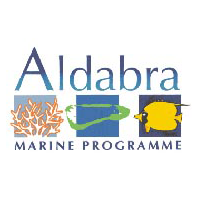Conservation
Threats to the Aldabra Marine Environment
There is a growing consensus amongst leading scientists that coral reefs throughout the world will undergo massive changes within the next few decades.
The causes are increasing levels of anthropogenic atmospheric gases responsible for global warming (causes increased incidences of coral bleaching and related mortality), and a reduction in carbonate saturation in tropical surface (this reduces the ability of reef corals and other organisms to calcify, with possible dire consequences to existing populations).
If you add to this other anthropogenic effects such as destructive fishing methods, sewage discharge, eutrophication etc. the outlook for coral reefs is not good.
Threats which have implications for the health of the Aldabra marine community:
Aldabra is a UNESCO World Heritage Site and therefore protected from many anthropogenic disturbances, added to this it is very remote so activities elsewhere in the area do not appear to affect life on the atoll to any great extent. However, this is no reason for complacency and the following threats could become a problem in the future:
-
Global Threats
• Sea temperature anomalies This causes corals to expel symbiotic algae that live in their tissues, after which they either recover and take on new algae or die (mortality may only be of part of the colony, or may be complete).
• Changes in weather patterns Global temperature changes would change weather patterns which could threaten reefs through storm damage or changes in ocean current routes. Reef distribution would change given time.
• Sea level rise This is more of a threat to humans, if sea level rises corals will probably keep growing upwards and keep up with it as has occurred before in the past.
-
Local threats
• Pollution
• Oil Spill This would have devastating effects on all terrestrial and marine ecosystems. If the proposed Astove Oil Terminal is to proceed careful consideration needs to be given to a contingency plan as Aldabra is directly downstream and potentially could suffer long term low level chronic stress from this facility. Improper waste disposal
• Damage from tourism – damage to coral reefs when snorkelling and diving. This is minimal at Aldabra but an orientation programme on the terrestrial and marine environment must be carried out to all visitors
• Illegal fishing – over exploitation of reef and pelagic fish species (including rays, sharks), as well as turtles and lobsters. Illegal foreign drift nets and purse seine nets
• Macroalgal invasions may result through a loss of coral cover, decline in herbivorous fish population and/or increased input of nutrients into the marine system. The latter is unlikely to be a factor in Aldabra given the low level of human activity on the atoll. Algal blooms have occurred following the bleaching event but herbivorous fish populations do not appear in decline and will reduce the likelihood of algae dominated reef.

